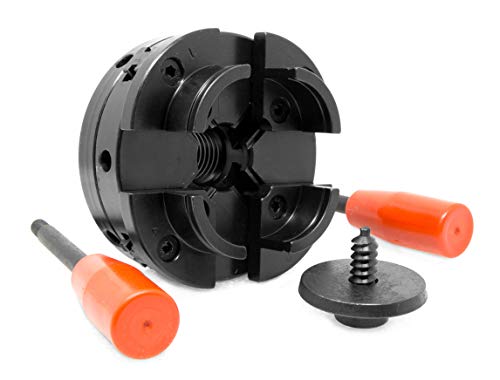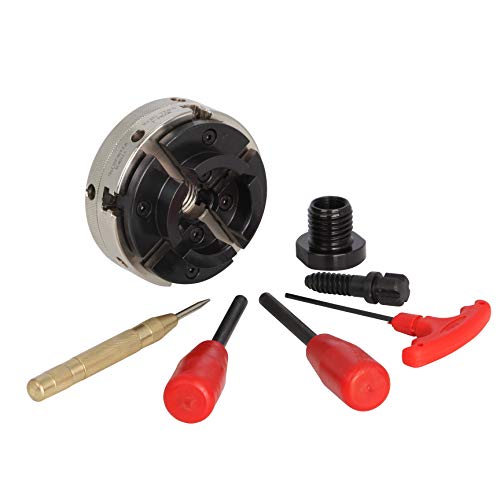Picture yourself standing at your lathe, watching wood shavings curl away as your latest masterpiece takes shape. You’ll need a reliable chuck to bring your creative vision to life, and 2026’s top wood lathe chucks offer innovative features that weren’t available just a few years ago. From the professional-grade NOVA PRO-TEK G3 to budget-friendly options like the WEN series, these six chucks can transform your woodturning experience.
NOVA PRO-TEK G3 CHUCK Bundle with Jaw Sets & Accessories
Woodturners seeking a thorough chuck solution will find exceptional value in the NOVA PRO-TEK G3 Bundle. With its premium nickel plating and upgraded 6-point star fasteners, this chuck delivers durability and reliable performance. You’ll get four jaw sets, including the versatile PRO-TEK and JS100N bowl jaws, perfect for both small and medium projects.
The precision laser-etched numbering makes jaw changes quick, while the intuitive clockwise action guarantees secure gripping. You’ll appreciate the strong 50mm PRO-TEK jaws with improved dovetail design for maximum control. Backed by a six-year warranty and boasting a 4.8-star rating from 231 reviews, this bundle proves itself as a trustworthy investment.
Best For: Intermediate woodturners looking for a comprehensive, high-quality chuck system that can handle various project sizes and who value durability and precision in their tools.
Pros:
- Complete bundle includes multiple jaw sets for versatile project capabilities
- Premium nickel plating and 6-point star fasteners ensure longevity and reliable performance
- Precision laser-etched numbering and intuitive design make jaw changes quick and simple
Cons:
- Higher price point compared to basic chuck systems
- Limited to 1″ x 8 TPI thread size without insert options
- Relatively heavy at 7.06 pounds, which may affect balance on smaller lathes
WEN 3.75-Inch Self-Centering Lathe Chuck Set (LA4374)
For hobbyists seeking a versatile chuck that won’t break the bank, the WEN LA4374 3.75-inch self-centering lathe chuck set delivers impressive functionality for small to medium-sized projects. You’ll appreciate its internal jaws that handle workpieces from 1-1/4 to 2-1/2 inches, while external jaws accommodate pilot holes up to 3-1/8 inches.
Compatible with multiple WEN lathe models and sporting a 1″ x 8 TPI thread, this 5-pound chuck offers reliable performance for bowls and spindles. While some users report issues with stripped gears, the chuck’s keyed tightening mechanism and solid gripping capability make it a practical choice for woodturners working within its 4-inch maximum workpiece capacity.
Best For: Hobbyist woodturners and DIY enthusiasts seeking an affordable, versatile chuck for small to medium-sized lathe projects under 4 inches in diameter.
Pros:
- Compatible with multiple WEN lathe models and features standard 1″ x 8 TPI threading
- Versatile jaw capacity for both internal (1-1/4″ to 2-1/2″) and external (up to 3-1/8″) workpieces
- Self-centering design with keyed tightening mechanism for secure grip
Cons:
- Some users report issues with stripped gears over time
- Limited to maximum 4-inch workpiece capacity
- Customer service response times from manufacturer can be slow
4 Inch Wood Lathe Chuck Set with Self Centering 4 Jaw
The DEEFIINE 4-inch self-centering chuck set delivers exceptional value for hobbyist woodturners who don’t want to invest in premium brands like Vicmarc or Oneway. You’ll appreciate the nickel-plated finish that resists rust in humid workshops, along with CNC-processed parts for enhanced durability.
The kit includes five jaws plus a large plate jaw to handle various block shapes, and comes with essential accessories like a tightening gear key and T-Allen wrench. While some users report minor runout and rough jaw edges, most find it’s a reliable performer for the price, earning 4.6 stars from users who praise its versatility and stability.
Best For: Hobbyist woodturners and beginners seeking a versatile, budget-friendly chuck set that offers good functionality without the premium price tag of high-end brands.
Pros:
- Comprehensive kit includes multiple jaw options and necessary accessories
- Nickel-plated finish provides good rust resistance
- Excellent value for money with 4.6-star user rating
Cons:
- Some users report minor runout issues affecting precision
- Rough jaw edges may need smoothing
- Loose jaw adjustment holes reported by some customers
WEN LA164K 5/8-Inch Keyed Drill Chuck with MT2 Arbor Taper.
Designed specifically for WEN lathe models, this keyed drill chuck with MT2 arbor taper offers versatile workpiece holding capabilities up to 5/8 inch in diameter. You’ll find it compatible with any MT2 drill press, lathe, or mill, making it a versatile addition to your workshop.
With its M21 thread size and three-jaw design, you can securely hold drill bits and pen mandrel shafts. The included key guarantees precise tightening control, while installation requires just a rubber mallet. At 2.44 pounds, it’s substantial enough for stability while remaining manageable. Users consistently rate it 4.6 out of 5 stars, praising its sturdiness and value.
Best For: Woodworkers and hobbyists who need a reliable drill chuck for their WEN lathe models or any MT2-compatible machinery, particularly those working with materials up to 5/8 inch in diameter.
Pros:
- Universal compatibility with MT2 machines beyond just WEN models
- Sturdy construction with precise three-jaw gripping system
- Easy installation process requiring only a rubber mallet
Cons:
- Relatively heavy at 2.44 pounds
- May require cycling to achieve optimal performance
- Limited to maximum workpiece diameter of 5/8 inch
WEN LA4444 4-Inch 4-Jaw Self-Centering Chuck Set with 1-Inch x 8TPI Thread
Woodturners seeking reliable performance at a budget-friendly price point will find the WEN LA4444 4-jaw chuck set compelling. This versatile chuck features dovetailed jaws that grip both internal pilot holes and external stock, with capacities ranging from 1.6 to 3.2 inches depending on your mounting method.
You’ll appreciate its compatibility with WEN wood lathes, including popular models like the 3420 and 3421. While it’s an excellent choice for beginners, you’ll want to take into account adding a set screw to prevent unseating during operation. The chuck comes with a screw chuck for additional project support and handles bowls, spindles, and other common turning projects effectively.
Best For: Entry-level woodturners and hobbyists seeking an affordable, versatile chuck for basic turning projects on WEN wood lathes.
Pros:
- Compatible with multiple WEN lathe models and Nova chuck accessories
- Versatile jaw design accommodates both internal and external workpiece mounting
- Includes screw chuck for additional project support options
Cons:
- Lacks a set screw, which may require modification for secure mounting
- Limited to 4-inch maximum workpiece size on some lathe models
- Requires experience to ensure proper grip and prevent workpiece ejection
4INCH 4-Jaw Self-Centering Wood Lathe Chuck (SCR4-4)
Versatile and robust, VINWOX’s 4-inch self-centering chuck stands out as an excellent choice for woodturners who need precision and adaptability in their projects. You’ll appreciate its high-grade K1045 steel construction with electric nickel plating that prevents rust and guarantees longevity.
The chuck’s internal jaws handle workpieces from 1-1/2 to 3 inches, while external jaws accommodate pilot holes from 2 to 3-5/8 inches. It’s compatible with most major lathe brands and comes with essential accessories like dovetail jaws, tightening levers, and a screw chuck. With precision-machined guides and a self-locking system, you’ll get reliable stability for your bowls, cups, and vases.
Best For: Woodturners of all skill levels seeking a versatile, reliable chuck for various projects from bowls to vases on mini, midi, or heavy-duty lathes up to 14-inch swing.
Pros:
- High-quality K1045 steel construction with nickel plating for durability and rust resistance
- Wide compatibility with major lathe brands and comprehensive included accessories
- Precise self-centering mechanism with strong gripping power for various workpiece sizes
Cons:
- Relatively heavy at 6.57 pounds, which may affect balance on smaller lathes
- Limited to 14-inch swing capacity, restricting use on larger lathes
- Higher price point compared to basic chuck options
Factors to Consider When Choosing a Chuck for Wood Lathe
When you’re selecting a wood lathe chuck, you’ll need to assess several critical factors including the chuck’s size capacity and thread compatibility with your lathe’s spindle. You’ll want to take into account the types of jaws available for your intended projects and guarantee the chuck’s material and construction quality meet professional standards. The choice between self-centering and manual chucks will depend on your specific turning needs and skill level, with self-centering options offering more convenience for beginners.
Chuck Size and Capacity
Understanding chuck size and capacity is essential for selecting the right wood lathe chuck for your projects. You’ll find most chucks range from 3.75 to 4 inches in size, which determines your maximum workpiece dimensions.
When using internal jaws, you can secure pieces between 1-1/4 to 3 inches in diameter. If you’re working with larger projects, external jaws accommodate pilot holes from 1-3/4 to 3-5/8 inches. You’ll need to match your chuck’s thread size, such as 1″ x 8 TPI or 3/4 x 16 TPI, to your lathe’s specifications for proper mounting.
Don’t overlook the chuck’s gripping design – different jaw profiles like dovetail or serrated patterns affect how firmly you can hold your workpiece during turning operations.
Thread Size Compatibility
Thread size compatibility stands as one of the most critical factors in choosing a wood lathe chuck, as mismatched threads can derail your entire turning operation. You’ll need to verify your chuck’s thread size precisely matches your lathe’s headstock specifications, typically available in 1″ x 8 TPI or 3/4″ x 16 TPI configurations.
When you’re shopping for a chuck, always check your lathe’s thread specifications first. Using an incompatible thread size won’t just compromise your turning accuracy – it can potentially damage both your chuck and lathe through unwanted vibrations. If you’re working with different thread sizes, you’ll find that many modern lathes accept adapters, giving you more flexibility in your chuck selection. This adaptability lets you work with various chuck options while maintaining the secure fit essential for safe, precise turning.
Jaw Types Available
Beyond matching thread sizes, jaw types represent the next key consideration in selecting your wood lathe chuck. You’ll find self-centering jaws that automatically align your workpiece, while adjustable jaws can handle irregular shapes and varying sizes.
The most versatile options include dovetail jaws, which excel at gripping both external and internal surfaces, and serrated jaws that provide enhanced grip on rough materials. Many chucks feature dual or multiple jaw configurations, letting you work with different diameters using both internal and external grips. Premium models offer superior torque mechanisms and durable finishes that resist wear over time. You’ll want to check if your chosen chuck accepts interchangeable jaw sets, as this compatibility expands your turning capabilities and allows you to tackle diverse projects.
Material and Build Quality
Material composition and construction quality form the foundation of a reliable wood lathe chuck. You’ll want to look for chucks made from high-grade steel with nickel plating, as these materials enhance durability and resist rust, ensuring your investment lasts longer.
When evaluating build quality, pay attention to CNC-processed parts and precision-machined guides. These features maintain proper alignment and stabilize the chuck during operation. A heavier chuck will typically provide better stability and reduce unwanted vibration while you work. Look for models with upgraded fasteners and self-locking systems, as they’ll give you a more secure grip on your workpieces. Consider chucks from manufacturers who demonstrate rigorous quality control through testing and actively incorporate user feedback into their designs.
Self-Centering Vs Manual
When choosing between self-centering and manual chucks, you’ll need to weigh several key factors that impact your woodturning experience. Self-centering chucks offer automatic alignment and consistent gripping strength, reducing vibration and saving setup time. They’re particularly beneficial if you’re new to woodturning, as they simplify the workpiece securing process.
Manual chucks, while requiring more skill and patience, give you greater versatility with different jaw configurations and accessories. However, you’ll need to adjust each jaw individually, which can be time-consuming. For heavier or longer workpieces, self-centering chucks often provide better security through their keyed tightening mechanisms. Consider your experience level and typical projects when deciding – if you’re a beginner or value efficiency, a self-centering chuck might be your best choice.
Accessories and Extensions
Choosing a chuck with extensive accessory compatibility can considerably expand your woodturning capabilities. You’ll want to look for chucks that offer various jaw options, including both internal and external configurations, to handle different workpiece sizes and shapes.
Most quality chucks come equipped with essential tools like tightening gear keys and T-wrenches, making adjustments and workpiece changes more efficient. You’ll also benefit from systems that support specialized accessories such as screw chucks and project-specific jaws, which give you more versatility whether you’re a beginner or experienced turner.
Before making your final decision, check if the chuck system you’re considering can adapt to other lathe brands. This cross-compatibility guarantees you’ll be able to use a wider range of extensions and attachments as your skills grow.
Price Vs Performance
How much should you invest in a wood lathe chuck? While entry-level models offer a budget-friendly starting point, they often lack the grip strength and adjustment precision you’ll need for more demanding projects. Mid-range chucks hit the sweet spot between affordability and functionality, making them ideal for both beginners and experienced woodturners.
If you’re serious about your craft, consider premium chucks. They’ll give you enhanced jaw mechanics, superior wear resistance, and compatibility with more accessories. Though they cost more upfront, the investment typically pays off through better project outcomes and longer-lasting performance. When evaluating options, look at user ratings to gauge value for money – they’ll help you determine if a chuck’s performance justifies its price point for your specific needs.
Mounting and Installation Requirements
The mounting and installation requirements of a wood lathe chuck can make or break your turning experience. You’ll need to confirm your chuck’s thread size matches your lathe’s spindle perfectly – common sizes are 1″ x 8 TPI and 3/4″ x 16 TPI.
Before purchasing, verify your chuck’s compatibility with your specific lathe model. Consider the installation mechanism – some chucks require keyed tightening for better grip, while self-centering designs offer easier operation. Pay attention to the chuck’s weight, as heavier models provide more stability but may demand a more robust lathe.
Look for chucks that include installation tools like T-Allen wrenches or tightening levers. Having the right tools bundled with your chuck will make setup and adjustments much more straightforward and save you additional purchases.








